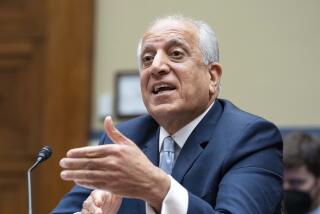Now he tells us
- Share via
GEORGE BUSH’S MAN IN BAGHDAD, U.S. Ambassador Zalmay Khalilzad, was refreshingly candid in an interview he granted this newspaper on Monday. Describing the situation in Iraq, he acknowledged that the United States had opened a “Pandora’s box” when it removed Saddam Hussein from power, creating the potential for widespread sectarian violence to lead to a civil war between Sunnis and Shiites.
Khalilzad’s observation would have been obvious to anyone in Iraq in the aftermath of the Feb. 22 bombing of a Shiite mosque in Samarra. But because the Bush administration’s spin machine has been so relentless, it’s noteworthy, sadly enough, to hear a top U.S. official bluntly state what is clear to anyone else on the ground in Iraq. Usually such candor from high-ranking administration officials -- about Iraq or anything else -- comes only after the word “former” appears before their titles.
The ambassador’s dire talk of a possible worst-case scenario in Iraq that would make Taliban Afghanistan “look like child’s play” is in stark contrast to the president’s consistently rosy platitudes about the marvels of an emerging democracy on the Tigris. The administration’s assumption that the war would lead to the building of a prosperous and democratic Iraq that would be the envy of the entire Middle East is looking rather dubious now, as its own ambassador is pointing out.
Khalilzad, an Afghan American who previously served as the nation’s representative in Afghanistan, has proved to be a skilled diplomat, energetically pursuing Washington’s agenda with Iraq’s fledgling government without coming across as the overbearing American consul. The ambassador deserves credit for prodding all factions to come together and diffuse the recent tensions in the aftermath of the Samarra bombing.
That said, there is no easy prescription for addressing the dangers Khalilzad describes. He is speaking out as Iraqi political factions negotiate the composition of their new government and Washington debates the appropriate U.S. troop levels for Iraq going forward. The new Iraqi government faces a deadline of March 12 for its first session, although that is likely to be delayed. Meanwhile, U.S. generals are expected to meet with President Bush soon to discuss reducing troops, which currently number about 130,000.
The ambassador said it would be disastrous for the United States to abandon Iraq the way it disengaged from civil wars in Lebanon and Somalia. But if sectarian violence were to someday degenerate into an all-out civil war in Iraq, is there anyone who seriously believes that the U.S. military should be asked to put an end to it? And is Khalilzad really suggesting that the United States could have stopped the civil war in Lebanon? Khalilzad’s worst-case scenario is so bad it almost makes the numbers of U.S. troops on the ground an academic question.
But the ambassador is right that it is too soon to give up on Iraq. The country may be a far cry from the shining beacon on the hill in the Middle East that many think-tank neocons once dreamed of creating. Yet there is still a chance that a stable, peaceful state can emerge. The consequences of utter failure -- characterized by a dismemberment of the nation into warring sectarian regions -- would be disastrous for U.S. interests.
More to Read
Sign up for Essential California
The most important California stories and recommendations in your inbox every morning.
You may occasionally receive promotional content from the Los Angeles Times.













